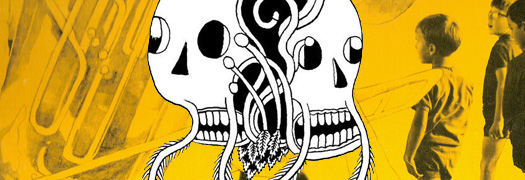
Features | Lists
By The Staff
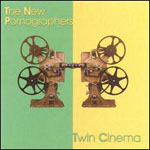
60 :: New Pornographers
Twin Cinema
(Mint/Matado; 2005)
I never thought of the New Pornographers as much of a power pop band, or at least not in the early stages of their career. Despite being lauded as the second coming of Big Star and the Buzzcocks, Mass Romantic (2000) and Electric Version (2003) are, in truth, pretty straightforward indie rock albums spiced up with occasional Game Theory synth shout-outs. The transparent mixes and unpretty vocals on those albums (not a bad thing) more closely resembled Of Montreal neo-psychedelia than classic Big Star or actual 2000s power poppers like Teenage Fanclub or Fountains of Wayne—but hearing Twin Cinema for the first time made me reconsider my take on the band. The performances here are more elegant than anything they had accomplished before, with smooth croons and languid guitar licks replacing Mass Romantic‘s high shrieks and wacky tag lines; the production is richer, more diverse, from the “Hey Jude” chanting on “The Bleeding Heart Show” to the cello backbone of “These Are the Fables.” Lines like “sing me Spanish techno” are catchy in that insidious way that makes a listener kind of happy the song won’t leave the brain. And when it wants to be, almost at whim, the group is just as angular as ever, cycling through odd time signatures on “The Jessica Numbers” with abandon. The band has one of the most distinctive, polished sounds in contemporary pop music, instantly recognizable even on a Challengers (2007)-level debacle. Twin Cinema, of course, is no debacle—just an account of a real-life supergroup finally living up to the promise in being called that.
Skip Perry
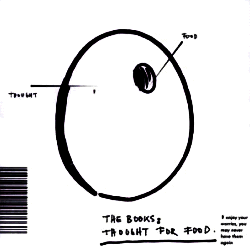
59 :: Books
Thought for Food
(Tomlab; 2002)
When I attempt to quantify Thought for Food‘s assets, trying to get a discernible grip on its otherwise indiscernible breadth, I’m only left with one real statistic: that there’s so much love in this album. Sure there’s astounding meticulousness within; magnanimity; a devotion inherent in sewing together sound collages like this—but that’s not exactly what I mean. There’s an openness here, an embracing of languid folk textures with the intuition and concision of crate-digging; black wit here married gracefully to concern and empathy; Phil Elvrum and Matthew Herbert copulating passionately, grunting in whispers—but that’s not what I’m getting at either. What I mean, what translates as goosebumps from the trivial noise of the quotidian, what sounds purposed made from purposeless pieces, from stuff long gone to basements and the archives of local news affiliates who’ve given up on concern for local news, is a staunch, unwieldy, overwhelming feeling: of love. As in care for care’s sake, the Golden Rule, Christ-like effulgence spread equally over the hobo and the tycoon both. Imagine me whispering this: I am in love with this album.
With this as their debut, the Books were able to instantly fit themselves into a post-Since I Left You (2000) world by staking a survey marker at the foot of what the Avalanches had accomplished and having no intentions to accomplish the same, coming up with a hybrid of dance music, musique concrète, and chamber pop that seemed as obvious in the early part of this decade as it was unexpectedly difficult. Because the Books are not a band to nod or move enjoyably to; the body wouldn’t be able to ignore its own awkwardness. Instead, the Books are physical in an entirely selfless way, inhabiting the voices they pull from the boring ether by giving them a position, a placeholder, a pot to piss in. A golf announcer ushers in an epic bridge; a laughing toddler sets and then re-sets a track’s cadence. Otherwise, these squawking, mewling, gibbering nobodies would have nothing special to remember them by, no one catching their vocal ephemera. Even when quoting Godard’s Contempt for the song of the same name, the recitation is terse and robotic, the “Do you like my ankles?” line of questioning taken from its origins in lingering erotic tension to casual coffee and cereal chat. It’s the sound of sampling as moral responsibility, like the Plains Indians using every part of the slain buffalo and then giving thanks to the animal’s memory. Thought For Food precluded Danger Mouse and Girl Talk and much of the mash-up acolytes by creating an ethical high ground for how they did business: Night Ripper (2006) takes useful samples out of context and devalues them by default; the Books take already devalued and dispossessed samples and give them context, gives them reason. The Books are like Jesus.
And like Jesus, the Books can often be obstinate, unhinged; Thought For Food can flap from ball-peen hammer bass hits and snapping strings to a single, yawning cello without warning. I have trouble explaining why most of what happens on this album happens the way it does—the stupidly scrambled song titles; the uneventful skit-like monologue of a dead fish that only serves to assert its being dead; the song “Deafkids,” which feels suddenly wrong right there at the end of the album, a “silencio!” killing the roomnoise like a sick joke. Some of this can’t be more than some extravagant fucking around.
But amidst the playful banter and aerobic pace of “All Our Base Are Belong To Them” or “Mikey Bass,” which sound exactly as you think they do given those names, is “Motherless Bastard,” a simply building slice of neo-classical bliss prologued by a heartbreaking exchange between, we can only assume, a little girl and her father. We’re thrust into the middle of the two, the father denying his ties to his daughter, white noise taking on character, him going so far as to make her cry his name desperately before reprimanding her in a business-like bluntness: “Don’t touch me, don’t call me that in public.” (And thus we imagine him cringing from his daughter’s exasperated approach.) If it’s one of the members of the band talking—Nick Zammuto sings and plays guitar; Paul de Jong plays cello—it makes me shiver to think how he could do that to his kid, which is absurd given the brevity of the byte. But the melancholy-thick music that follows, seemingly inspired by the anguish in the little girl’s voice, is stirringly composed. “Motherless Bastard” builds a whole wonderful song around our empathy for someone we don’t know at all; when, as the strings are at their most swollen, the girl’s “Mommy, Daddy” chant surfaces, it’s bathed by different lights and swaddled in different white noise, as if her sorrows have been quashed and she’s no longer orphaned. There’s genuine relief in the song’s denouement.
And that’s when I get the deepest urge to call my brother, who I rarely see in person much anymore, him across the country in Philadelphia in the Coast Guard and me in Portland doing way less impressive things, to confirm that we both remember being in his car years ago, before we left for different oceans, and hearing “Motherless Bastard” together and playing it really loudly to compare gooseflesh. I’ve gone on about that song because of the confused feelings inherent, of being reminded that I don’t call my brother enough, that I worry about his safety, that I secretly wonder why I care about him so much, if it’s obligation; why I don’t really call to so easily figure that out. But in my long affair with this record, capped by this blurb here and memories therein like a renewing of vows, I’ve found that that’s how one listens to Thought For Food: by holding out one’s forearm and peeling back one’s sleeve. In silencio. And our conclusion upon finishing the song? That we have the exact same amount of goosepimples—give or take.
Dom Sinacola

58 :: Akron/Family & Angels of Light
Angels of Light & Akron/Family
(Young God; 2005)
It’s clear the instant those clusterfuck bellows kick-in on “Moment”: this record is enormous. Not enormous like Sufjan’s sweeping cartographic symphonies or Sunn 0)))‘s enveloping dirge. This record is enormous like little else is. Call it indie music’s Infinite Jest, not in girth or scope so much as in its boundlessness of vitality, in its exhibition of such ardor and zeal. There’s just so much packed into these twelve songs—so much joy and sadness, hands-holding singalongs and misty-eyed laments, titanic gestures and incisive nuance, even a goddamn Bob Dylan cover—that it feels like nothing’s been left out. “Many years ago,” they holler in unison on the world-enveloping “Future Myth,” “we found that light and sound were ample food”—and if that’s the case then this is the 72oz steak, the Ponderosa buffet, that imaginary play-doh food-fight from Hook. It’s pure sustenance and if given the choice, it’d be my last meal before execution.
The pot-bellied studio grunts behind the current Loudness Wars, furrowing their brows in frustration as they attempt to nudge Kurt Hammett further past eleven, are approaching the issue from entirely the wrong angle. For Akron/Family and the Angels Of Light, volume means a magnitude of space, not sound; the studio is just a void to be occupied, dimensions to be used up. Engineers can’t tweak that for you. Forget about peak levels and dynamic range compression because this album’s brand of volume has presence; you can feel something in this record, genuine fucking esprit, and know it’s something special, something…spiritual, maybe. Akron/Family have always resembled a cult and here non-believers find revelation. Prepare to be converted.
Calum Marsh
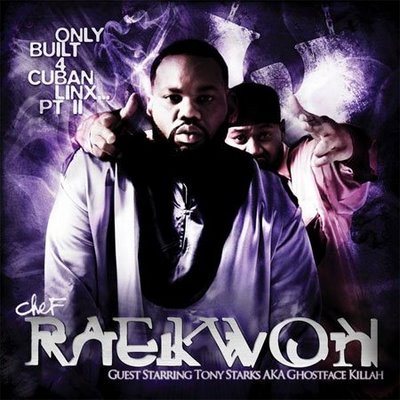
57 :: Raekwon
Only Built 4 Cuban Linx 2
(Ice H20/EMI; 2009)
One of this sort of list’s inevitable frustrations—as well the primary motivation for waiting to publish our decade-end coverage after the decade in question had actually ended—is that a sense of a record’s “timelessness,” contentious enough a notion for the already-enduring, gets progressively more difficult to gauge as the gap between release and retrospective narrows. You probably have a better sense of a ’90s canon now than you did in the early days of 2000 because distance alters perspective; it’s tough to know if what matters now still will and for how long. The oldest records on this list, those barely qualifying as noughties-borne (and before you ask: Vision Creation Newsun and Agaetis Byrjun officially dropped in ’99), have already benefited from nine- or ten-year gestation periods. We’ve seen their relevance persist, and permanence, in a few special cases—still curious about how Kid A (2000) and Supreme Clientele (2000) will fare further up this list?—is already pretty much undeniable. It’s the music with which we’re less intimately familiar, albums we’ve had with us for a fraction of that time, that we approach with due caution. How can we compare sexy new flings to long-standing, carefully cultivated relationships?
And with that disclaimer, let’s come right out and admit it: yes, we’re still in the honeymoon period with Only Built 4 Cuban Linx 2—the long-anticipated sequel to Raekwon’s classic solo debut, and our 2009 AOTY—but we’re willing to boldly bet on this one now. Of course, it helps that the record doesn’t feel honeymoon-new—in picking up where the original Cuban Linx left off (like, it really does: it begins with the sample that brought Part One to a close), the Chef’s brought us straight back to the Wu-Tang solo-project glory days of 1995. Sentimental longing was a major trend in indie music last year, but there’s a crucial distinction in Raekwon’s approach: all the trademark Wu-isms—like samurai kitsch and thug-life caricature—aren’t employed for the sake of nostalgia, they’re employed because they’re conventions that, in his hands, make for great records. Call it a tribute to Wu-styles of old if you will, but there’s no need to reminisce about the old days when the new days are just as good. So, yes, despite Cuban Linx 2 being less than seven months old, I’ll call it now: in ten years we’ll be looking back on this, still the second best Cuban Linx, as one of the decade’s most enduring hip-hop Greats. Wu-Tang Forever.
Calum Marsh
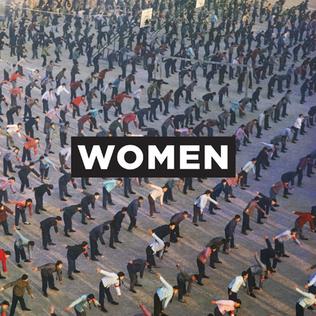
56 :: Women
Women
(Flemish Eye; 2008)
Over the past decade, a series of weird, often embarrassingly public, events befell the word indie. Take a moment to conjure your favorite; I will think of Kimya Dawson and Adam Green sitting beside Barbara Walters at a taping of The View. And whether this sort of thing bothers you or not, the result was clear: the term indie became commodified into something safe and predictable, and our expectations of anything bearing its mark seemed to be irrevocably lowered. It was in this climate that we declared, in 2008, Women’s unassuming and virtually flawless self-titled debut “the best indie rock record of the year.” Though it was easy to take something like that as a backhanded compliment, we meant it in the best way. Women felt simultaneously unexpected and familiar; it was also, as a lot of great records of indie past have been, vaguely at odds with the world into which it was birthed. Because if there’s one thing we can give the laziest (and, often, most visible) practitioners of the shitgaze trend, their ubiquity has made records that actually embrace varying textures seem more refreshing than ever. Women sounds like the noises an old house makes when nobody’s home, but, unlike some of the decade’s other big indie records that were successful in conjuring sonic space—Grizzly Bear’s Yellow House (2006) and the Microphones’ The Glow Pt. 2 (2001) come to mind—Women isn’t grandiose or sprawling; instead, it’s a lesson in concision. (Now would be the time to mention that it was recorded by Chad VanGaalen, no stranger to this list.) From the spidery riffs of “Lawncare,” to the ambient hum of “Woodbine,” to the warped ominousness of “January 8th,” Women is both a self-contained statement and a hugely promising hint of what’s to come from this band. So as we’re wont to do at this juncture, let’s crank up the praise: Women is one of the best indie rock records of the decade. And yes, even in a post-Juno world, we mean that as a compliment of the highest sort.
Lindsay Zoladz
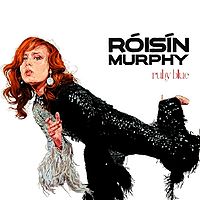
55 :: Róisín Murphy
Ruby Blue
(Echo; 2005)
No other album sounds quite like Ruby Blue. That said, a few qualifiers are in order: Ruby Blue is not, of course, the first album to fuse jazz with electronica or even with dance music (for better or worse, jazz has been among the more malleable mediums of the past century); nor is it the first successful stab at molding stubbornly outré experimentation into listenable pop songs; nor even does it break new ground in applying an everything-but-the-kitchen-sink ethos to beat-making and skewed arrangements with such pointillist precision and internal flow (the album’s producer, Matthew Herbert, had already made a name for himself years prior doing exactly that, often tossing in the sink as well); nor (at risk of belaboring the point) can we claim that Ruby Blue was the first to temper and massage its cold machinations with the warm invitation of a top-notch crooner.
So, no, Róisín Murphy’s career apogee is not of totally alien origins. But that’s not the point; I can’t think of any other album in the last decade that so brazenly attempts every single trick described above virtually all the time and succeeds so wildly. Like, indisputably. And similar to Saint Dymphna (2008), Strawberry Jam (2007), or, hell, Scale (2006), Ruby Blue doesn’t even acknowledge a trade-off between pursuing high art and tickling our most reliable pleasure points. Excluding the bare closer, “The Closing Of The Doors,” even the album’s ostensibly straightforward ballads are rife with experimental tinkering. While “Through Time,” perhaps the sweetest of the bunch, floats atop a relatively simple (for Herbert, at least) rhythm, its true foundation is a looped and stretched one-second sample of Murphy’s voice, a sine wave of pulsing delicacy which theoretically replaces the woman who would sing harmony or some shit.
Elsewhere, Herbert’s bold idiosyncrasies and Murphy’s extraordinary gift for jumping pitch and volume at the drop of a hat are less veiled. “Leaving the City” is a chopped-‘n’-screwed amalgam of middle-eastern guitar, discordant jazz piano chords, deep rolling percussion, and about a million other indecipherable flourishes that each flash for a split second and then are never heard from again. “Sow Into You” is equally polyrhythmic, bright horns and synth arpeggios all thrown in a blender, yet I don’t really see people dancing to this—because of the obvious difficulty in doing so, as well as the need to just sit back and witness, mouths agape, the sheer audacity of it all. Most of the lyrics here are about love and doing it (that trusted fountain of artistic inspiration), yet the music is the real love letter: two unfathomably talented artists playing to each other’s strengths and challenging each other to push the envelope that much further with every song. What’s not to love?
Traviss Cassidy
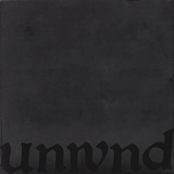
54 :: Unwound
Leaves Turn Inside You
(Kill Rock Stars; 2001)
What a noisy, brooding, statuesque slab of pseudo-emo post-punk: I fucking love it. Leaves Turn Inside You is the more obscure and mature precedent for that And You Will Know Us By the Trail of Dead record that got a 10.0 (which I also love but sounds like Sum 41 in comparison). On their final studio album Unwound, a fairly well-respected indie three-piece in their time, decided to go Greek-sized epic by way of two discs (sumptuously packaged, by the way) and rock composition that’s just plain sick on the creativity scale. And it all starts with the creativity of that three-piece: the bass, drums, and guitar hone in on the most Sonic Youth-y aspects of the Nirvana paradigm but then shoot for an opulent dynamic that only happened for Nirvana when Cobain tried to solo. And yet nothing on this record is imprecise; though distortion and dissonance are the common swaddling, on a fundamental level everything is rendered with the utmost clarity for the utmost impact, irregular chord progressions and thunderous drum lines color-blocked against each other while string quartets and piano and freakin’ mellotron do their best to evoke an oxymoron: minimal chamber-pop. Sorta like what you’d imagine arrangements would have been on Yo La Tengo’s And Then Nothing Turned Itself Inside Out (2000) if apt to the title. Thing is, Unwound’s edgy noise-rock at the core of these songs is pushing at those chamber walls, begging to get out. If there’s sludge it’s because the clay of moody accoutrement is melting under the band’s heat.
While the first disc is basically one brazen aesthetic achievement after another (even a decade later the ravenous thump-beat that opens “Terminus” is an “oh shit” moment), it’s on disc two that Unwound come prepared not only to boggle our minds and wreck our ears but carry in tow with them the songwriting that will wrench at our guts. “October All Over” captures the quiet despair that creeps in at fall’s close, the pall of seasonal death echoing the entropy we feel in our own bones, while the disappointment of another year ending with nothing better to show for it just adds insult to injury (“when it rains it feels like shame”). Justin Trosper’s wryly dour lyrics know us middle-class Northerners, know our pitiable tendencies to lock ourselves in our houses or “find a new city to blame” or to treat our weekends as our heavens. But damn if that’s not empathy in his voice when he sings “sometimes you’ll laugh so hard you cry.” Then on “Below the Salt” Unwound harness one of the key effects of Slint’s seminal Spiderland (1991): long, off-beat dirge boiling up into post-rock catharsis. They do so beautifully, too, the best example of such a track since “Washer” and “Good Morning, Captain,” really. In it there’s a realization that the truth in its entirety is something that can’t be spoken and that our expressions of it are varying degrees of meaningless; truth for us is only made real in the living of it, a painful enough process in its own right even as it helps us grow into what we were made to be. It’s a sort of fatalism turned po-mo and for the better, the record’s title playing on the recurrent fall and winter imagery but also the idea of leaves of a book turning inside each of us, the scenes and chapters that make up our stories gliding toward completion. Leaves Turn Inside You serves as a final act of sorts; Slint couldn’t make themselves release another record after their artistry imploded on itself with their magnum opus and neither, it seems, could Unwound. And, kid brother Source Tags and Codes (2002) aside, there hasn’t really been another record like this one since.
Chet Betz

53 :: Fennesz
Endless Summer
(Mego; 2002)
Christian Fennesz’s oddly strategic disintegrations unquestionably make him a part of any discussion about the decade’s canonical ambient, because he boldly forgoes the binary tendency of that genre to shiver entirely with ecstatic romance or hovering doom. Rather a subtle exploration of space and melody, Endless Summer is still regarded as Fennesz’s most balanced statement, heralding the double-oughts’ vigorous and vital development across the ambient and noise spectrum. Though this list will come to other (and later) ambient records, this blurb is the essential shout-out to one of the genre’s most foundational precedents, the record from which so much of the later decade’s music was derived.
An emphasis on melody amid so much textural production and percussive noise still makes the record sound ahead of its time, all these years later. Fennesz came to work with atmosphere in more nuanced manners, but here—necessarily first—he shows that the accessibility of tunefulness need not be constrained to pop structures and dynamics. Endless Summer is as much a mission statement for the genre as much of Eno’s trailblazing, and almost seems like that vital stuff that can be viewed underneath layers of lesser music’s peeled-away pretense.
Conrad Amenta
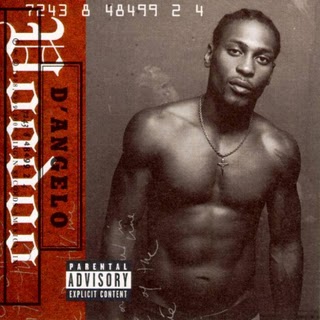
52 :: D'Angelo
Voodoo
(Cheeba Sound/Virgin; 2000)
D’Angelo becoming an artiste is one of the great unfulfilled promises of the decade, but sitting it out for even longer than his already very patient peers (Maxwell, Badu, Lauryn Hill, Bilal, and, hell, even Q-Tip) has only made the mystique of Voodoo grow into a bizarre beast of its own. D’Angelo’s appeal has expanded from those attracted to his neo-soul and “discursive play with masculinity and blackness” (that’s me quoting Wikipedia quoting some journal essay; thorough journalism at its finest), to something entirely, confoundingly different, maybe one of the first artists of the decade to be present and then away long enough to be so richly re-discoverable.
Voodoo’s creative overflow owes much to its position as a number one priority during the late-nineties Soulquarians renaissance; Brown Sugar, his 1995 debut, was a big hit and all, but, more importantly, it seemed to codify some new template for soul music, a genre which had almost entirely been submerged by rap. That D’Angelo could write a handful of hit R&B singles the old-fashioned way—see: synths; see: effortless and patient chord progressions—made him an unlikely rallying point for a bevy of future stars like Common, the Roots, or even an uncredited Saul Williams (who wrote the liner notes that read like a manifesto). Their co-option of Electric Lady Studios and earthy production values cut a wide swath across major label alt-hop albums during the four years it took to finish Voodoo, but unlike other period highlights like Things Fall Apart (1999), Like Water For Chocolate (2000) or Mama’s Gun (2000), there is something to Voodoo, something entirely sui generis.
The superficial “black history horn charts” are still there, and songs like “Africa” are liquidly aimless in a way that the whole album could’ve been (i.e. a group of talented musicians with a strong aesthetic union getting high and believing in themselves a little too much). But thanks to the inimitable anchoring of Pino Palladino (the Soulquarians’ oddball, a white, middle-aged, Welsh bassist who has gone on to such illustrious, talent-wasting gigs as the Who and John Mayer), D’Angelo finds a completely different grounding than the ’70s samples that dominate his friends’ songs—one ominous, dense, and funky. Brown Sugar was able to fit into the mid-nineties pop scene so well because D’s slinky hooks were basically original versions of the kind of G-funk that Dre had made de rigeur, and his Princely falsetto nastiness (not to mention compositional technique) filled an opening that the Artist himself had recently vacated due to certain, uh, slavery-related issues. But the easily overlooked, central element of the album was that he wasn’t sampling shit. It might have sounded like it, what with the hip hop beats and all, but the fact that D’Angelo could really play was what set him free, what set him apart from his peers both commercially and critically.
Thus: Voodoo. Palladino’s behind-the-beat bass, seemingly always a note away from tripping over itself, is pushed to the front in an assaultive way, and like Jah Wobble’s iconic bass lines for Public Image Ltd., it provides a hypnotic musical center for a majority of the album, a sort of spare but assertive identity. DJ Premier may give “Devil’s Pie” the beat and vocal scratches that make it stand out, but it’s the way D’Angelo matches him and ups the ante at every turn that lifts the song into transcendence. Playing all the instruments, D’Angelo works it cagily, slurring smoothly, gathering the tension of the atmosphere, never quite cashing in the accrued anger of the lyrics but instead letting that be the song’s fuel.
Other than the Method Man/Redman collabo “Left & Right” (whose cold sexual aggression is kind of spectacular when twinned with the tough, arty backing), its slow burn is the most upbeat thing on the album. And indeed, each song is like a fully formed variation on that early-established bass foundation, from the dark swagger of “The Line” to the pure classic soul of “Send It On” and the casual “Chicken Grease.” Unlike Brown Sugar, whose loverman archetypes often became oppressive outside the context of radio, D’Angelo swaps in such fronting for a different kind of confidence: no longer wasting all of his voice and charisma on shallow concepts, he spends his artistic faith on not-so-easy climaxes, restraining his voice while multi-tracking, distorting, mumbling, and distancing himself from the lyrics, gathering up steam.
Until there’s “Untitled (How Does It Feel).” After an hour of feints and hints and directions both dizzyingly unexpected and totally cohesive, the song—which isn’t exactly obvious as R&B chart material, with a classic-rock guitar hook and lilting, nearly unintelligible phrasing—offers D as consummate craftsman and classic star, piano and guitar covering a couple songs’ worth of melodic ideas, and finally that voice, gone all out. It ends in the middle of the title (“How does it—”) and leaves the pay-off up to us.
Chris Molnar
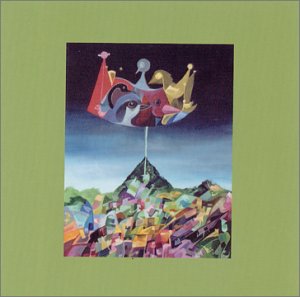
51 :: Circulatory System
Circulatory System
(Cloud Recordings; 2001)
When returning to Circulatory System’s debut album, my first thought was if I would never be able to re-create the confused haze I was in when I first heard and fell so catastrophically in love with it. And yet there it was, so well preserved I could immediately identify it, like Kim Novak in Vertigo, pointing to the rings of the giant redwood: here I was born, and here I died. Hell, this record is like a hundred deja-vu experiences at once, even on first listen: melodies and lyrics echo each other across tracks in a way so rich your brain doesn’t even fully register it. With Olivia Tremor Control, Hart found a way to transfer the Beatles and Beach Boys into an explosion of analog fuzz; with Circulatory System, he seemed to reach back into an imagined history of pop, finding the most elemental but protean melodies and covering them in mulch. As a result, we get 22 slightly-different ways of looking at the same object, which is whatever you care to name that’s bigger than ourselves: “All we / all we / all we are are fingers on the reaching hand.”
That this record seems to slow down time is so obvious it’s barely worth mentioning. To listen to it is to be cast as a Macy’s day float in a funeral march, head swelling to the point where the pressure is almost unbearable. It starts out with children doing a count-in only to have the band enter at half-speed, as if they needed to concentrate as hard as possible to get bogged down in the imbroglio. Before Hart found lo-fi electronics again on Signal Morning (2009), Circulatory System was a thick, hairy monster; people only call it “noisy” because there’s so much going on at one time, and because everything’s just slightly off-kilter. Sometimes Hart literally distorts the past, like the woodwinds at the end of “Yesterday’s World” which sound like Benny Goodman through a funhouse mirror. At other times, even more fantastically, the music seems at odds with itself. On “Joy,” the band keeps getting slightly ahead of Hart’s hauntingly serene, pithy proclamations, while on “Outside Blasts” he seems to be combating those evil-sounding Oooga-chaka voices in the background. Humbly, the moments that do willingly carry the irrefutable pop-juggernaut legacy of Wilson/Lennon/Elephant6—like “Illusion,” or those that shift into gorgeous pastoralia, like “Now” or that cello part in “Inside Blasts” when Hart keeps repeating “looping….looping…looping…looping”—are few enough that their power remains in tact even over dozens of listens. Sublimity itself is fleeting.
But enough about its eccentricities. Here’s why you should care about this album: because it creates its own environment with all its corresponding tensions and contradictions, something the most left-field avant-garde records have struggled to do, without ever even remotely sacrificing its sense of melody. Because it’s one of the few pop records of the decade to be conceived as a single piece of music. Because it enacts that eternal ritual where great records become their own subject, in an inscrutable loop. Because Hart creates a head-trip but is nice enough about it to console you throughout, reminding you to breathe (hence all the navigational metaphors throughout). Because in a decade full of indie self-consciousness and irony, it is completely unafraid of embracing wide-eyed idealism and retrograde psychedelic tropes. Because, after all, those questions Hart asks throughout—“Who wants to rise above their chemistry?”; “Should a cloud replace a compass?”; “Can we go back in time?”—are all rhetorical.





